Fig. 7. Schematic of the molecular mechanism underlying the cognitive decline induced by the long-term consumption of ice water in APP/PS1 mice.

The long-term consumption of ice water induces neuropathy, such as abnormal nerve cell activity, aggravated senile plaque formation and neuronal injury, and cognitive decline that is related to (1) decreases in pepsin activity and the gastric emptying rate, which cause a decrease in calorie intake and an increase in the consumption of stored energy in the body, leading to a loss of body weight; (2) a decrease in calorie intake that induces insufficient peripheral insulin and causes less insulin to be transported into the brain, which inhibits PI3K/Akt signaling, leading to abnormal energy metabolism (changes in ATP, the EC and the ADP/ATP ratio); and (3) an imbalance in neurotransmitters (the glutamate/GABA ratio).
